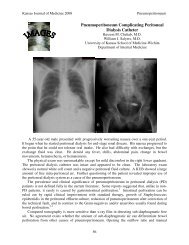A Chronic Care Model Program Incorporating Group Office Visits for ...
A Chronic Care Model Program Incorporating Group Office Visits for ...
A Chronic Care Model Program Incorporating Group Office Visits for ...
You also want an ePaper? Increase the reach of your titles
YUMPU automatically turns print PDFs into web optimized ePapers that Google loves.
Kansas Journal of Medicine 2011 <strong>Chronic</strong> <strong>Care</strong> <strong>Model</strong> <strong>Program</strong><br />
presented in part as abstract poster<br />
presentation at the annual Society of General<br />
Internal Medicine meeting in Pittsburgh, PA<br />
in April, 2008.<br />
Keywords: obesity, primary care, chronic<br />
disease<br />
Appendix<br />
98<br />
Corresponding author: Jianghua He, Ph.D.,<br />
KUMC, 3901 Rainbow Blvd., Robinson<br />
5026M, MS 1026, Kansas City, KS 66160<br />
Table A1. Summary of semi-structured participant interviews by topic.<br />
Topic Area Summary Results from 30-Minute Interviews with 14<br />
Participants<br />
<strong>Visits</strong> with continuity primary care physician About half of participants who had a clinical visit with<br />
their primary care physician during the study indicated<br />
Brief structured individual visits with research<br />
physician during group office visit<br />
Brief structured individual visits with study nurse<br />
during group office visit<br />
Brief structured individual visits with health<br />
psychologists to review health behavior goals related<br />
to weekly diet diaries<br />
improved obesity care<br />
Most participants indicated that these visits were helpful<br />
and encouraging. A few indicated that the visits were<br />
often rushed and disorganized.<br />
About half indicated that the nursing visits were helpful<br />
and encouraging. The other half did not find them<br />
helpful because one of the nurses was not supportive at<br />
all, and there was not continuity of nursing care.<br />
All participants found these visits very helpful in staying<br />
on track and learning new tips <strong>for</strong> weight control.<br />
Several did report that they often felt rushed and wanted<br />
more time.<br />
Intensive lifestyle training group sessions Most felt that the sessions were extremely helpful and<br />
they appreciated the support of others and the<br />
in<strong>for</strong>mation learned. Several reported that sessions were<br />
rushed and they wished there was more time <strong>for</strong> in depth<br />
discussion.<br />
Calorie and fat intake goals Several felt that these were unattainable, but most felt<br />
that the goals were helpful in planning meals.<br />
Food and activity logs Several felt that the self-monitoring was cumbersome<br />
and not helpful at all. Most agreed that the idea was<br />
important, but the reality of self-monitoring was a lot of<br />
Major barriers to reaching weight control goals<br />
during the study<br />
work.<br />
Lack of will power, reluctance to monitor calories, lack<br />
of exercise, high stress, poor emotional state, comorbid<br />
medical conditions<br />
General comments and feedback Learned a lot, enjoyed the group camaraderie, would<br />
have preferred smaller group with a more com<strong>for</strong>table<br />
room with a place to write and place materials











